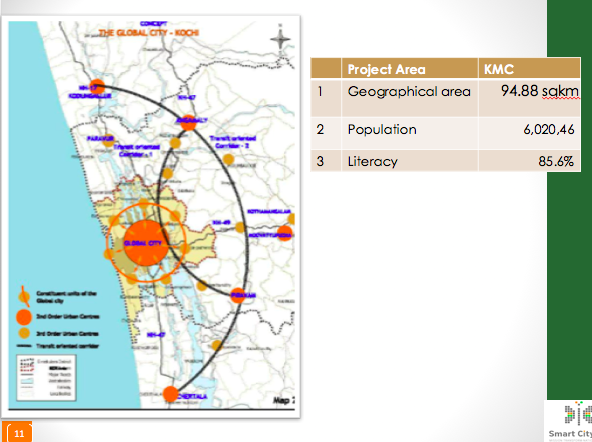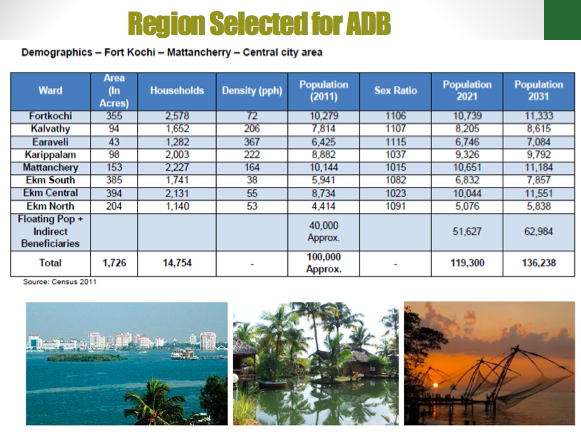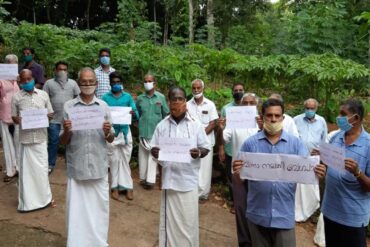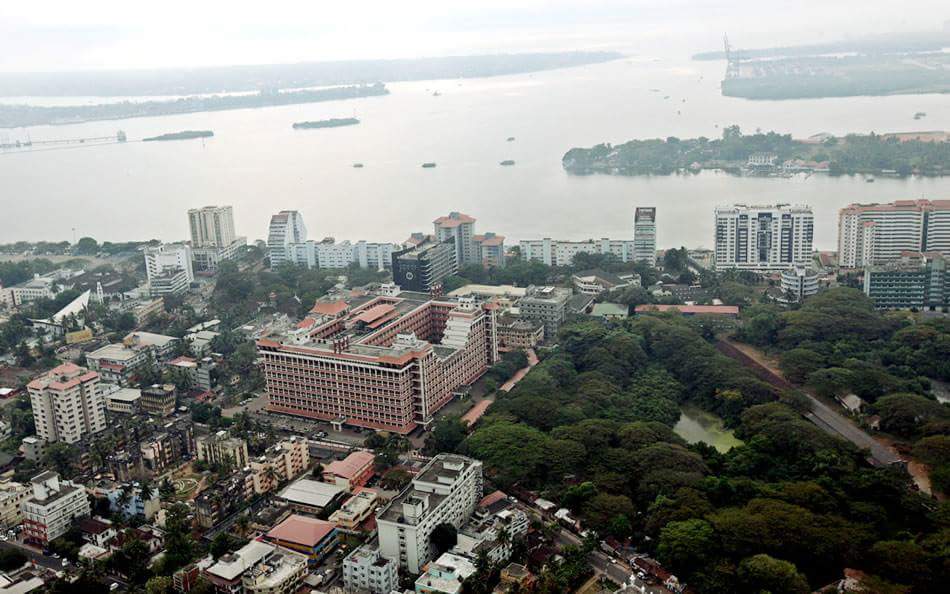Smart Cities Mission obliquely tinkers with the 3-tier democratic structure. The Corporation will have no say in the running of the Kochi Smart City
Kochi has been riding a wave of euphoria ever since it had been ranked 5th among 20 cities in India in the 2nd round of the Smart Cities Challenge conducted by the Ministry of Urban Development, Government of India. We have been wowing ourselves: You can hear it on the radio and you can see it in print and it was a selling point in the local body elections in 2015. And very likely to be used for the assembly elections too.
We, Kochities, love that: to be told we rank among the best in the country. The official website of Kochi Corporation in a self congratulatory note says the ranking was decided by an expert team. Big deal? The least the MoUD can do is put an expert team to choose the best 20 cities to qualify for the Smart City Challenge.
Then embellishing it with a lot of jargon the corporation website enlightens us as to the purpose of the Smart Cities Mission. It says: “purpose of the Smart Cities Mission is to drive economic growth and improve the quality of life by enabling local area development and harnessing technology, especially technology that leads to Smart outcomes.
Of the three options offered by the Ministry for developing smart city, Kochi went for the Retro-fitment mode where the existing city areas, including slums, will be re-developed with better planning, so as to improve the “liveability” of the whole city.” Bla bla bla…
Did your eyes glaze over that? Give it another shot. No? Don’t worry you are not the only one who cannot make head or tail of all that blah. Retrofitting, redevelopment, Greenfield development are jewels meant to addle your brain.
To make matters worse Kochites often confuse the Smart City Mission (the central government initiative) with the Kochi Smart City Project (an IT park that’s located in Kakkanad that the state government inaugurated a few weeks ago). Both are very different. The Smart City mission refers to a geographical area which lies within the Cochin Municipal Corporation while the IT park lies outside the corporation limits.
Kochi Smart City Area:
The area of 1726 acres (Kochi city: total area is 94.88 square kilometres) in 8 wards ( Kochi Corporation has a total of 74 wards) will come under Smart City. 5 wards in Fort Kochi and Mattancherry, in Ernakulam the area from the High Court to the lower court that extends all the way to MG Road and a bit of the backwaters too is the proposed area for the Kochi Smart City. But only 10 to 15 per cent of the total Corporation area and only 10 per cent of the total population will benefit from the Smart City Mission.

The plan is to retrofit around 500 acres of land which means spruce up the existing structures while a euphemism for displacement and eviction is “redevelopment” where around 50 acres of land in Mattancherry will be redeveloped and 250 acres falls under the Greenfield development.

Formation of SPV
The KOCHI Smart City area will be run by the Special Purpose Vehicle and not the Kochi Corporation. And here is where the alarm bells go off loud and screechy like an ambulance on its way to the emergency centre. Yes, the formation of the SPV is likely to tinker with the three tier democratic set-up. There is no clear idea what will happen to the 8 wards and the councillors who represent those wards. They are definitely not on the board of the SPV. Usually an SPV is in charge of a project like the Kochi Metro and not a geographical area. Here there is blurring of lines and takeover of the democratic system.
The Kerala formed the SPV on March 16 to run Kochi’s smart city consisting of eight members on its committee. The mayor of the Kochi Corporation Soumini Jain, is on the board but she is just a member nothing more. According to The New Indian Express report the others are mission director, APM Mohammed Hanish, secretary LSG, CIAL MD V J Kurian, Corporation Secretary Amith Meena, Principal Secretary (Ports) James Varghese, former chief secretary Jiji Thomson, KMRL MD Elias George and Ajit Patel. It is pretty clear that the board is filled with bureaucrats who are not answerable to the people of Kochi. As for the councillors of these 8 wards they are not on the board at all.
There’s was a tearing hurry to form the SPV and councillors say they have no clue what’s going on. In order to avail of the first portion of the Rs 200 crore central assistance (a total of 500 crores promised from the centre to each city in phases) the formation of Special Purpose Vehicle (SPV) to run this exclusive zone had to be created by the state government before March 31.
What is an SPV for Smart Cities? It is a public limited company run by a CEO
The MoUD website says that the SPV will be a limited company incorporated under the Companies Act, 2013 at the city-level, in which the State/UT and the ULB will be the promoters having 50:50 equity shareholding. The private sector or financial institutions could be considered for taking equity stake in the SPV. “The implementation of the Mission at the City level will be done by a Special Purpose Vehicle (SPV) created for the purpose. The SPV will plan, appraise, approve, release funds, implement, manage, operate, monitor and evaluate the Smart City development projects. Each smart city will have a SPV which will be headed by a full time CEO and have nominees of Central Government, State Government and ULB on its Board.” (If you want more gyan on SPV functions:http://smartcities.gov.in/writereaddata/SPVs.pdf
The GOI Smart Cities guideline says: “The Board of Directors will have representatives of Central Government, State Government, ULB and Independent Directors, in addition to the CEO and Functional Directors. Additional Directors (such as representative of parastatal) may be taken on the Board, as considered necessary.” One critic says that the number of representatives from the centre has not been specifically mentioned. Will that mean it will be in proportion to the amount invested by the centre? And also the CEO of the SPV will be appointed by the MoUD and can be removed only on the prior approval of the MoUD.
Is Smart City a city within a city?
And will it be run like a corporate with the CEO of the Special Purpose Vehicle (SPV) wielding all the powers?
Will the Mayor of the city just relegated to a post of board member?
Will the Centre have a say in running of this area?
Yes to all of the above questions.
BJP’s Corporate Agenda?
It was at the juncture just before the formation of the SPV that the Kochi councillors woke up and read the fine print. It says that all that all the rights and obligations of the municipal council will have to handed over to the SPV for the Smart City area. That’s not all the Urban Local Body has to delegate the decision making powers available to the ULB under the municipal act/ Government rules to the Chief Executive Officer of the SPV. One critic who did not want to be named, called the Smart City idea BJP’s Corporate Agenda, because it is corporatisation of a local body. The geographical State area will come under the control of the Central government which amounts to tinkering with the 3 tier democratic system.
The Shroud of secrecy?
The council has no clue what is going on and there has been no discussion about this. The councillor from Gandhi Nagar ward Poornima Narayan said there was no discussion about the Smart City Mission at all. “We’ve been promised that a detailed plan will be made soon. I have not seen the proposal and even a cursory glance through the Smart City guidelines on MoUD website tells you that the powers will be vested with the CEO of a company.” She reiterated that this was against the very spirit of the Panchayati Raj and will undermine the 73rd and 74th Amendment. The smart city is going to create an exclusive city within the city which is governed by a CEO. The CEO cannot be changed except with the approval of the MoUD, GOI.” Said a Congress councillor who dared not speak out, “It is strange that the Congress is keeping quiet about this because the Panchayati Raj was Rajiv Gandhi’s idea.”
The mayor of Kochi Soumini Jain (Congress) had expressed her apprehensions in February before the formation of the SPV. In an interview to The Hindu newspaper and to the Outlook magazine she had raised her concerns about handing over the powers to the SPV. She had told the Outlook “The apprehensions of the elected council are that there has to be a surrender of the power to the SPV. Some of the points in the formation of the SPV will destroy the power of the council. The SPV will formulate plans, manage the Smart City and decide how the funds that come to the corporation be used. The powers that the constitutionally elected body has got through a democratic process will have to be delegated to the SPV. We have a difference of opinion with that rule.”
Jain had expressed her apprehensions about the SPV and had explicitly given it in writing to the minister of Local self government, the state chief secretary and the secretary to the LSG in February. Jain who took over as Mayor about the time Kochi was selected as a Smart City in the second phase said they did not know about the powers of the SPV. “I understand that at each stage of the competition we were concentrating on getting to the next level. It is only then we became aware of the SPV and the delegation of powers.” Jain now seems to have given the green signal for the formation of the SPV.
Both the Left and the Congress Councillors seem to have the same apprehensions. Former mayor of Kochi, Tony Chammany wants to know if the Kerala Muncipality Act will be amended in the Assembly to delegate the powers of the Urban Local Body to the SPV. “The authority of the specific geographical area will have to be handed over to a Corporate type SPV. It was Rajiv Gandhi’s dream to create the Panchayati Raj and it is being tinkered with.”
Smart City Funding
*GoI funds: ~ Rs.500 cr
*Matching contribution by States/ ULBs: ~ Rs.500 crl
*User Chargesl
*Public-Private Partnerships (PPPs)l
*FFC recommendations (incl land based instruments)
*Municipal bonds
*Borrowings from bilaterals and multilaterals
*National Investment and Infrastructure Fund (NIIF)
* Convergence with other Government scheme
The biggest challenge is funding of the Smart City. The corporation which has no role in the governance of Smart City will have to source funds for the Smart City Mission which will constitute about 10 per cent of the total area. Even though the proposed Central Aid is 500 crores the city and the state has to find another 500 crores. They can rope in private entities too. Kochi city which has a revenue of less than 500 crores per annum may not have the funds to finance the smart city. So where will all money come from is a mystery?
Sources of Finance
MoUD also suggests that the city can enhance the funds by increasing the taxes like property tax, professional tax etc, and there can be entry tax, user fees etc which clearly spells there will be rise in taxes for people living in that area.
*Property tax
*Profession tax
*Entertainment tax
*Advertisement tax
*Octroi and entry taxes
* Enhancing Parking Fees
* Enhancing User Charges for services
The Smart City area may not be accessible to the common man unless he can afford to enter it. Does this mean each time a Kochiite wants to enter the Smart City Area to go to college, to the Corporation, the Courts or visit the parks or stroll down the beautiful walkway then he/she has to pay an entry tax. Besides creating a dichotomy within the city there is also the problem of displacement or “redevelopment” – the euphemism- employed by the MoUD. Where is the money going to come for eviction and rehabilitation? And A P M Mohammed Hanish, the mission director, says that the SPV will have the right to acquire land in that area.
The best public spaces of Kochi city like the Subash Park, Children’s Park, the corporation offices, a few colleges, the general hospital, the lower and the high courts fall in this area of Ernakulam while the heritage area of Fort Kochi which is the pride of Kochi will come under the Smart City zone. Says one of the key members in the original committee who chose the areas to be made Smart, “We chose the best areas in the city for we wanted the area that is utilized maximum by all the people to be developed.” Will these areas become inaccessible to the ordinary citizen of Kochi? Will this become an exclusive zone for the rich are questions that need answers?
Page 37 of Smart City proposal at 2nd Stage level titled Essentials Features of the Achievement Plan
Interestingly, MoUD says on its website that smart city means different things to different people. The definition goes on to elaborate philosophically and then pithily adds “there is no one way of defining a smart city”. Quite like the definition, the formation of Smart City too, is ambivalent.
Main photograph by Jawadhusain pallath, CC BY-SA 4.0







